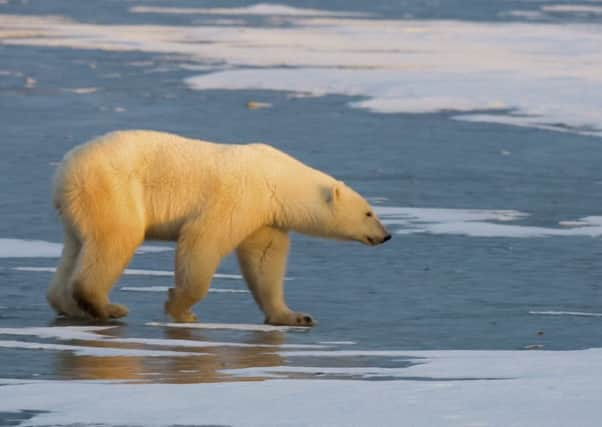Brian Monteith: Polar ice may be melting but the bears will be fine


Everyone likes polar bears. They look soft and cuddly, and are more charming and cute than big grizzlies. They are like snowmen come alive.
Often the subject of cosy, cheering, heart-warming illustrations or sympathetic documentaries, who cannot fail to be concerned about the fate of polar bears at the hands of man?
Advertisement
Hide AdAdvertisement
Hide AdThey are wild animals of course, so the reality is a tad more dangerous than we might like to suppose from the comfort of our armchairs or smartphones.
The same adoring relationship does not exist between humans and other threatened species.
Polar bears are the poster child for climate change warriors and as such their predicted demise has become a standard and necessary part of the climate change narrative.
But what if polar bears are not lurching towards extinction? What if they are doing quite well, thank you? What if they are even thriving? Where does that leave the clamour for climate change interventions, the Paris Agreement and its resulting taxes, regulations and restrictions?
Advertisement
Hide AdAdvertisement
Hide AdThis week a short video clip of a polar bear dying from hunger in Canada went viral on the internet with the accompanying claim by its producers that it was climate change that was destroying their habitat and leading to deaths amongst the species. Some media outlets such as Mail Online and the Guardian lapped up the story and swallowed the narrative whole.
Pity then the claim about the threat to polar bears is not a fact but an opinion unsupported by the evidence. Indeed the facts contradict the scaremongering of climate change warriors, for polar bear populations are actually healthy and in some areas growing.
Altogether there are about 30,000 polar bears – which is six, yes, six times the number there were just 50 years ago.
The truth happens to be that polar bears are a conservation success story and the problems that they face are not from climate change but other interventions, such as competition for over-harvested food resources.
Advertisement
Hide AdAdvertisement
Hide AdNature is tough, and it is no different for polar bears as it is for other wild animals.
When deer populations grow but have a limited source of food, some deer die a horrible death from starvation. That’s why deer are culled, it protects them from over-population.
Growing polar bear numbers facing a static or diminishing food resource will mean some bears, probably the poorer hunters among a group, will starve and die.
It’s not pretty, it’s gruesome, and makes for a sad and moving video – but it’s not the fault of man-made climate change.
Advertisement
Hide AdAdvertisement
Hide AdThis is not to say that the habitats of polar bears are not changing.
Summer ice that helps support the bears has indeed been decreasing, but they have adapted to change – as they did in the past.
Instead of the alarming predictions of their looming extinction, polar bears are in good fettle and should be taken off the list of threatened species.
All sorts of changes to our lifestyles and behaviours are being made on the basis that changes to our planet – such as the extinction of species such as the polar bear – must be prevented by switching away from carbon fuels that keep us warm in winter.
Advertisement
Hide AdAdvertisement
Hide AdThe latest proposal is to put a tax on cattle because they produce methane gas.
Like all such taxes, it will be the poorest that pay the most – as evidenced by 38 per cent of Scottish households now facing fuel poverty made worse by our climate change-influenced energy taxes.
Before we make more interventions we need to be sure of the evidence, not fooled by fake news from campaigners telling lies or half truths.